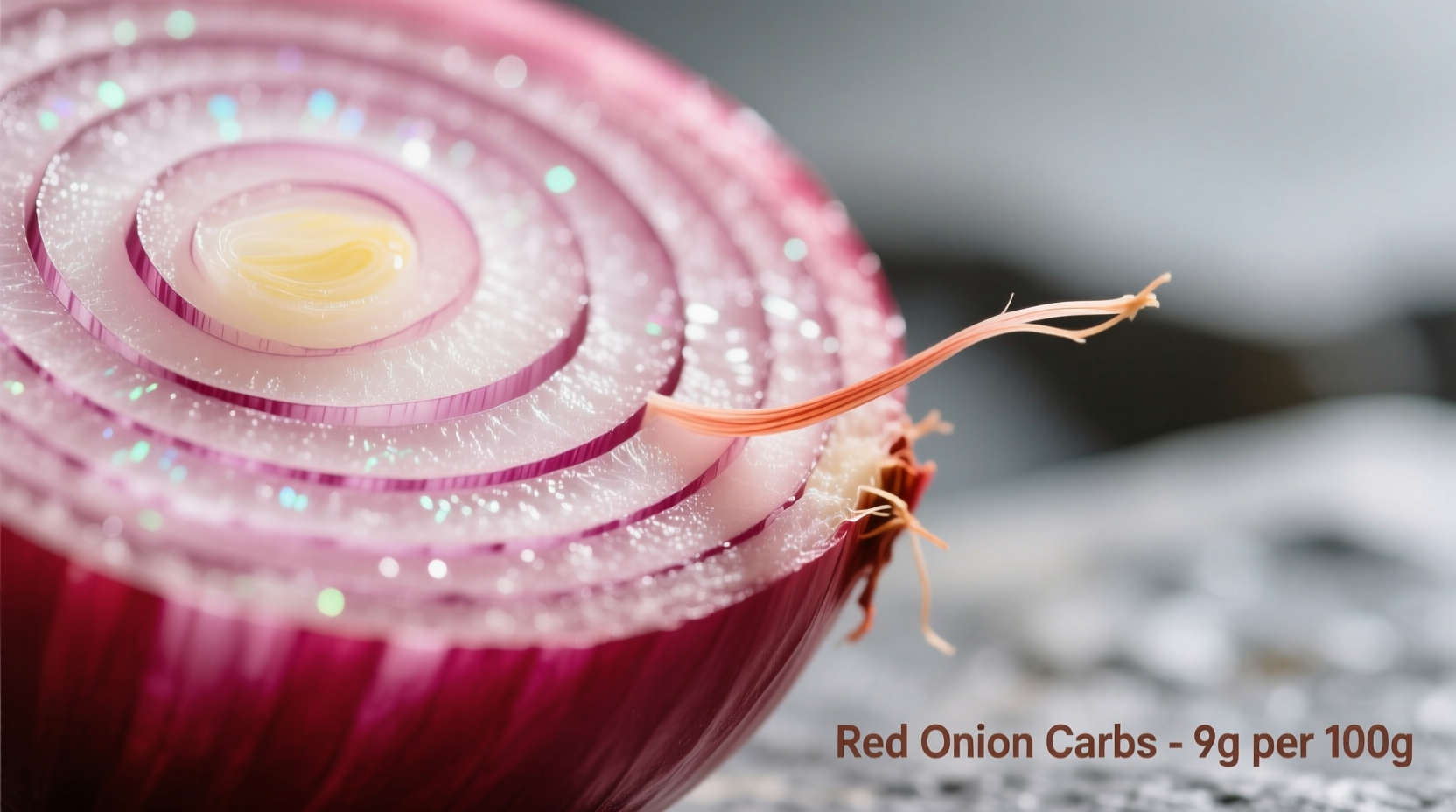One medium red onion (approximately 110g) contains about 10 grams of total carbohydrates, with 1.9 grams of dietary fiber, resulting in roughly 8.1 grams of net carbs. This makes red onions a moderate-carb vegetable that can fit into most balanced diets when consumed in reasonable portions.
Understanding the carbohydrate content of red onions is essential for anyone tracking their nutritional intake, whether for diabetes management, weight control, or specific dietary approaches like keto or low-carb eating. As a culinary professional who's worked with ingredients at every level from Michelin-starred kitchens to home cooking environments, I've seen how accurate nutritional knowledge transforms how people use even the most common ingredients.
Red Onion Nutrition: What the Numbers Really Mean
When evaluating red onion carbs, it's crucial to look beyond just the total carbohydrate number. The nutritional profile tells a more complete story that affects how your body processes these carbohydrates.
| Nutrient | Per 100g Raw Red Onion | Per Medium Onion (110g) |
|---|---|---|
| Total Carbohydrates | 9.3g | 10.2g |
| Dietary Fiber | 1.7g | 1.9g |
| Sugars | 4.2g | 4.6g |
| Net Carbs (Total - Fiber) | 7.6g | 8.3g |
| Calories | 40 | 44 |
These values come from the USDA FoodData Central database, the most authoritative source for nutritional information in the United States (fdc.nal.usda.gov). The fiber content is particularly important because it affects the net carb calculation that many low-carb and keto dieters track.
How Red Onions Compare to Other Onion Varieties
Many home cooks assume all onions have identical nutritional profiles, but there are subtle yet meaningful differences between varieties that affect their carb content and culinary applications.
| Onion Type | Total Carbs (per 100g) | Fiber (per 100g) | Net Carbs (per 100g) | Best Culinary Uses |
|---|---|---|---|---|
| Red Onions | 9.3g | 1.7g | 7.6g | Raw applications, salads, salsas, pickling |
| Yellow Onions | 9.0g | 1.4g | 7.6g | Cooking, caramelizing, soups, stews |
| White Onions | 8.6g | 1.3g | 7.3g | Mexican cuisine, raw applications, grilling |
| Shallots | 16.8g | 3.0g | 13.8g | Sauces, dressings, delicate dishes |
| Green Onions | 7.3g | 2.6g | 4.7g | Garnishes, salads, light cooking |
As you can see, while the differences in total carbohydrate content between red, yellow, and white onions are minimal, green onions offer a significantly lower-carb alternative. Shallots, often used in smaller quantities, actually have higher carb density than regular onions.
Practical Applications: Using Red Onions in Different Dietary Approaches
Understanding red onion carbs isn't just about numbers—it's about how to practically incorporate them into your eating pattern. Here's how red onions fit into various dietary approaches:
For Low-Carb and Keto Dieters
While red onions aren't considered low-carb by strict keto standards (typically defined as under 5g net carbs per serving), they can still be incorporated strategically. A quarter cup of diced red onion contains approximately 2 grams of net carbs, making it feasible to include small amounts in keto-friendly dishes for flavor enhancement without significantly impacting your daily carb limit.
For Diabetics and Blood Sugar Management
Red onions have a glycemic index of approximately 10, which is very low. This means they have minimal impact on blood sugar levels when consumed in typical serving sizes. The chromium content in onions may actually help improve insulin sensitivity, according to research published in the Journal of Nutrition and Metabolism.
For Weight Management
With only 40 calories per 100g and high water content, red onions add volume and flavor to meals without significant caloric impact. Their natural sweetness can reduce the need for added sugars in recipes, making them valuable for those watching their weight.

Maximizing Flavor While Managing Carbs
As a chef who's worked with ingredients across the culinary spectrum, I've developed practical techniques to get the most flavor from red onions while keeping carb intake in check:
- Thin slicing technique: Cutting red onions paper-thin maximizes surface area, allowing you to use less while still getting significant flavor impact in salads and sandwiches
- Vinegar soak method: Soaking sliced red onions in vinegar for 15-20 minutes reduces their sharpness, meaning you need less to achieve the desired flavor profile
- Strategic placement: Using red onions as a garnish rather than a main component lets you enjoy their vibrant color and flavor with minimal carb impact
- Caramelization science: When cooking red onions, the natural sugars caramelize, concentrating flavor so you can use smaller amounts in cooked dishes
Common Misconceptions About Onion Carbs
Several myths persist about onion carbohydrates that can lead to unnecessary dietary restrictions:
- Myth: All onions are high in carbs and should be avoided on low-carb diets
Reality: While not ultra-low carb, onions contain moderate carbohydrates that can fit into most dietary approaches when portion-controlled - Myth: Cooking significantly increases onion carbs
Reality: Cooking concentrates flavors but doesn't substantially change the carb content per serving—though you may use less cooked onion than raw for equivalent flavor - Myth: Red onions have significantly more sugar than other varieties
Reality: The sugar content across common onion varieties is remarkably similar, with differences of less than 0.5g per 100g
When Red Onions Might Not Be Your Best Choice
While red onions offer excellent flavor and nutritional benefits, there are specific dietary scenarios where alternatives might be preferable:
- Very strict keto diets (under 20g net carbs daily): Consider using green onions or chives, which have lower carb density
- During elimination diets for digestive issues: Raw onions can trigger symptoms for some people with IBS—cooking reduces FODMAP content
- When maximizing nutrient density per carb: For the same carb count, leafy greens provide more vitamins and minerals
Remember that individual responses to carbohydrates vary significantly. If you have specific health concerns, consulting with a registered dietitian who can provide personalized advice based on your metabolic response is always recommended.











 浙公网安备
33010002000092号
浙公网安备
33010002000092号 浙B2-20120091-4
浙B2-20120091-4